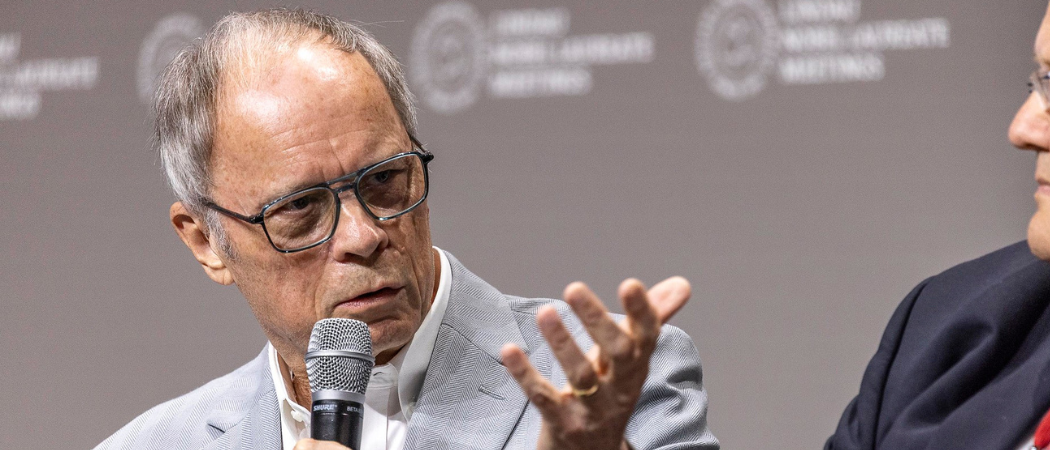Fragmented support and “fake collaborations” threaten Europe’s disruptive research, says economist Jean Tirole

Jean Tirole speaking at the 8th Lindau Nobel Meeting in Economic Sciences on August 26 in Lindau, Germany. Photo credits: Christian Flemming / Lindau Nobel Laureate Meetings / Flickr
Europe is undermining its own innovation potential by spreading research funding too thinly, according to Nobel Prize-winning economist Jean Tirole.
“Only 5% [of the Framework Programme annual budget] goes to disruptive research. That’s very little money. It’s almost nothing,” he said, speaking at the annual gathering of Nobel laureates and young scientists in Lindau, Germany, on August 26.
The EU should stop “sprinkling the money among many groups,” Tirole said, and instead focus on promoting disruptive research and “planting where the soil is fertile.”
“If you are not at the frontier of tech, you’re not sovereign anymore,” he added.
Tirole is currently based at the Toulouse School of Economics, where his research interests include industrial organisation, regulation, finance, macroeconomics and banking. He won the Nobel prize in 2014 for his analysis of market power and regulation.
In his speech, Tirole also criticised the current EU funding system for creating “fake collaborations” between firms, referring to collaborative research projects funded under Pillar 2 of the EU’s research Framework Programme, Horizon Europe.
These projects are designed to tackle complex issues that require interdisciplinary, cross-sectoral and cross-country partnerships. However, these alliances are seen as frequently being formed just to meet eligibility rules, rather than because they represent the best scientific fit, diluting both impact and disruptive innovation.
Tirole is not the first to take aim at Pillar 2. Daniel Gros, director of the Institute for European Policymaking at Bocconi University, has criticised Pillar 2’s large consortia, arguing that the EU should favour smaller projects with higher breakthrough potential.
Meanwhile, former Portuguese science minister Manuel Heitor recommended in his high-profile report on EU research that Pillar 2 should be guided by independent experts. He said that European Commission control, combined with member state haggling over grant calls, spreads funding too thinly across small projects, leaving each consortium partner with pitiful sums instead of meaningful resources to boost Europe’s technological capabilities.
Instead of addressing this criticism in its plans for the next Framework Programme, the Commission has proposed placing a €68 billion chunk of the Pillar 2 budget under the control of the new European Competitiveness Fund.
Related articles:
EU governments share the blame
According to Tirole, the fragmentation of research funding is not limited to the EU Framework Programmes. Around 90% of research funding across the bloc is managed by individual member states, which want to retain the privilege of distributing grants themselves. This means national governments and politicians largely decide who receives the money within their countries.
“The politicians, the bureaucrats, they put a lot of constraints, which go against top science and top research,” Tirole said. This means funding is spread thinly rather than concentrated on the most promising projects and researchers.
So, on one hand the Commission fails to allocate funding efficiently, while on the other, member states prioritise rewarding their own researchers instead of giving funds to an EU-level body. Together, this creates a fragmented system that favours political balance over scientific excellence, leaving Europe at risk of falling behind.
“People who are in power, they always want to distribute the chocolates,” Tirole said.
In contrast, Tirole praised the European Research Council (ERC), the EU’s main funding body for basic research, as a success story. He called it the “big exception” among EU agencies, because it allocates funding based purely on scientific excellence, and criticised the Commission its reluctance to replicate the model in other areas of research funding.
The ERC has favoured Tirole with grants on at least three occasions.





 A unique international forum for public research organisations and companies to connect their external engagement with strategic interests around their R&D system.
A unique international forum for public research organisations and companies to connect their external engagement with strategic interests around their R&D system.